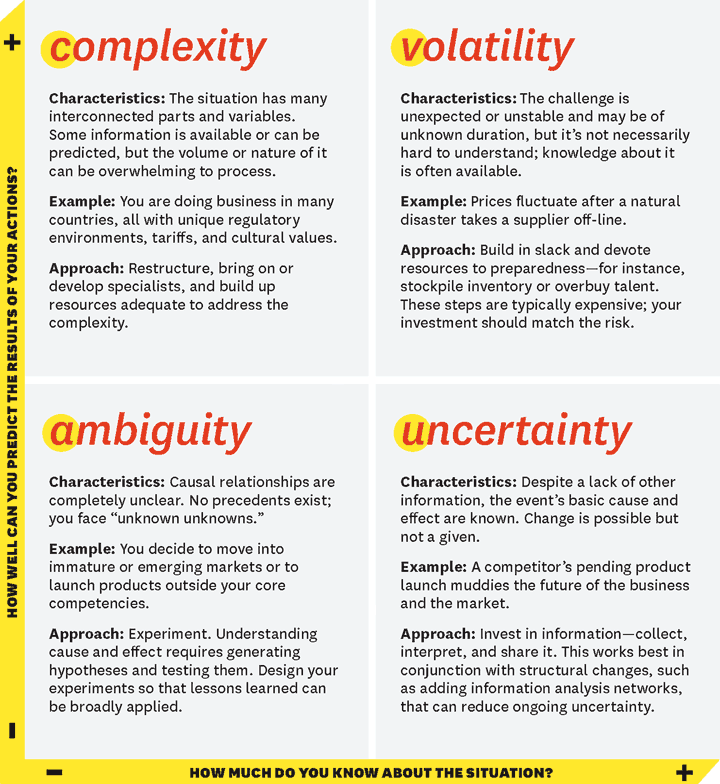What is VUCA and How Do You Lead in Challenging Times?
The term VUCA stands for Volatility, Uncertainty, Complexity, and Ambiguity. It was first used by the US Army War College to teach strategic leadership and decision making. Ever since VUCA has been widely used to describe the changing landscape of the business world.
Due to the pandemic, lockdowns, political shifts and ever-changing technology, the world is more volatile and ambiguous now. In a VUCA world, business leadership skills are critical. Leaders face unprecedented challenges as they navigate uncharted waters in this environment of volatility, uncertainty, complexity, and ambiguity.
What does VUCA mean?

Volatility
Volatility refers to unstable and changing situations. The world around us is changing faster than ever before. Dangers that result from the volatility of the VUCA world can be outdated information, slow feedback loops, and fear of risks.
Uncertainty
Uncertainty refers to the lack of predictability. As uncertainty is all around us, it is extremely difficult for decision-makers to forecast and allocate resources effectively. The uncertainty of the VUCA world can mean working with insufficient information or going back to old, “proven” methods.
Complexity
Complexity refers to the confounding of issues, no cause-and-effect chain and confusion that surrounds the organization. The volume of information is always increasing, and it is no longer independent. There are dependencies everywhere that must be taken into consideration.
Ambiguity
Ambiguity refers to the vagueness and lack of clarity. It is when the meaning of something is unclear even though an appropriate amount of information is provided. The inability to determine the sustainability of events and interpreting information falsely are risks of ambiguity in a VUCA world.
![]()
How do you deal with a VUCA world?
Leaders in the future will need to have Vision, Understanding, Clarity, and Agility as an antidote of VUCA (Volatility, Uncertainty, Complexity, and Ambiguity).
Here are the four skills and abilities that leaders can use as an antidote to VUCA:
Vision
Vision counters Volatility. Leaders with a clear vision can better navigate volatile environmental changes such as Pandemic and economic downturns.
If you are leading a team, you need to share this vision with them. When they see what you see, everyone can arrive at the same place. A place where everyone overcame the challenges to reach the ultimate success. Creating strong and compelling team objectives and values is a good step for developing a clear vision for the future.
Understanding
Understanding counters Uncertainty. If you want to prevail in a VUCA environment, you must learn to look beyond your functional areas of expertise. That’s how you can make sense of the volatility and uncertainty around you.
Always make sure to establish regular and clear communication in your team. You need to ensure everyone is aligned with the essential understanding needed to reach the end goal.
Moreover, you need to stay up to date with industry news and listen to what customers say to have a better understanding.
Clarity
Clarity counters Complexity. You need to focus on the right priorities and stop wasting energy on anything that distracts you from achieving your goal.
Sometimes team members have a different take on the steps they need to follow to obtain the results. This may lead to complexity. As a leader, it is vital for you to make sure every team member is on the same page. You need to provide a clear direction and design processes as simple as possible.
VUCA environment is often too complicated for one person to handle. Developing teams and building collaborations can work effectively in a fast-paced, unpredictable environment.
Agility
Agility counters Ambiguity. Here agility refers to the ability to communicate across the organization and move quickly to apply solutions.
Reducing the vagueness and lack of clarity can make the organization more agile. In addition, it gives you the ability to think and draw conclusions quickly. You can encourage your team to think and work outside of their usual functional areas, to expand their knowledge and experience. Job rotation and cross-training are some of the ways to improve team agility.
You have two choices: allow VUCA to overload and overwhelm you or accept the challenge and manage it. If you see VUCA as a challenge to improve your leadership and management skills, you can turn it into an opportunity.
Empower your team to deal with unpredictable forces and make them more resilient by focusing on Vision, Understanding, Clarity and Agility.
At Response DGA, we create a digital growth marketing strategy that is not only innovative and market-leading but, most importantly, delivers commercial success. Would you like to discuss a full-funnel digital growth campaign?
Write a Comment